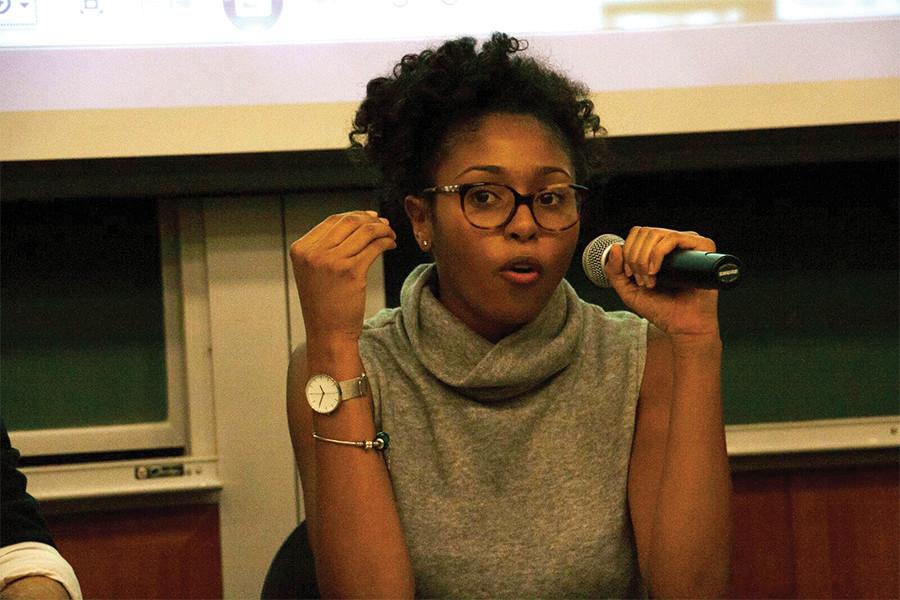Students discuss experiences with mental illness at Stigma Panel
Katie Pach/The Daily Northwestern
Medill senior Taylor Shaw explains her struggle with depression at the Stigma Panel hosted by NU Active Minds. Around 40 people were at the Stigma Panel to hear four different student panelists speak about their mental illness experiences.
November 16, 2015
Four Northwestern students recounted personal experiences with mental illness, from depression to anorexia nervosa, to a crowd of about 40 people Sunday night.
The Stigma Panel, held for the fifth year in a row by NU Active Minds, featured Bienen junior Jacob Pope, Medill senior Taylor Shaw, Bienen-SESP freshman Phoebe Glowacki and a Weinberg senior who preferred to remain anonymous. The panel was an effort to reduce the stigma around mental illness, said Sarah Moss, co-president of NU Active Minds and a Weinberg senior.
“We don’t do a good job fostering an environment conducive to mental health,” Pope said. “We’re busy all day, every day. And if you’re not stressed to the point of breaking, you’re doing something wrong. We put ourselves through the wringer here at Northwestern.”
Pope and Shaw both addressed how the “elite” Northwestern environment can create excess stress due to a lack of a culture that prioritizes students taking care of themselves physically and mentally.
Pope said because he did not have much experience with the term “mental illness,” and due to societal beliefs that men should keep their problems silent, he felt extremely alone. Pope didn’t realize there was something abnormal with his constantly negative thoughts until he was spoken to by hospital staff after a suicide attempt, he said.
Shaw said she discovered she had depression in her sophomore year at NU. This summer she created a documentary, “Brave Girl,” detailing her struggle to inspire others who may be feeling similar emotions, she said.
Glowacki delved into her struggle with anorexia nervosa and panic disorder. She said she found her vibrant, fun personality diminishing as she dealt with physical and verbal abuse as well as the death of her grandfather, who was “morbidly obese.” Blaming herself, she said she stopped eating and struggled with her weight loss until she received treatment the summer after her senior year of high school.
“Eating disorders are not fueled by a desire to be thin,” Glowacki said. “It’s not so much wanting to be thin as being afraid of giving up something that makes you feel safe and in control.”
A Q&A session, fueled by topics the panelists discussed, ended the event. Panelists answered questions about finding a psychologist that fits best, distinguishing between depression and feelings of sadness, and dealing with the shame brought on by mental illness.
Active Minds, a student group dedicated to reducing the stigma surrounding mental illness, brought the national Send Silence Packing program, a display of 1,100 backpacks representing the number of college students that commit suicide every year, to NU’s Deering Meadow earlier this year.
Moss said the organization hopes to host firesides, conversations in which people can get together to discuss issues related to mental health. Active Minds will also prepare for Stress Less Week, a series of generally free programming held during one of the many midterms weeks in the winter, Moss said.
For Stress Less Week, the organization will work with local businesses to offer classes and events that help students de-stress, Moss said. The board will try to incorporate more original ideas and unique events, like potential music therapy sessions, in addition to offering yoga and painting classes, she said.
Even as the board plans for more activities, Moss said she feels good about the organization’s productivity this Fall Quarter. The organization received publicity because of Send Silence Packing, and its goal to promote open conversation is being accomplished through the Stigma Panel, Moss said.
“Talking about these issues is extremely important,” Pope said. “You are not alone. Getting help is a difficult first step, but you can take it. With the proper resources in place and with the right atmosphere of empathy and understanding, we can beat mental illness.”
Email: rishikadugyala2019@u.northwestern.edu
Twitter: @rdugyala822



